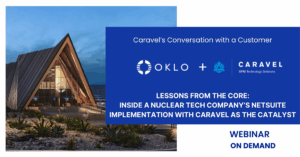We sat down with Caravel’s Director of Salesforce Practice, Kevin Dimond, and Senior Salesforce Consultant, Kelsey Rafac, to get an insider’s perspective on the responsibilities, challenges, and successes of a Salesforce implementation partner. Discover what they had to say and how you can apply this valuable insight into your due diligence for a CRM implementation partner.
What is a Salesforce Implementation Partner, and why do you need one?
A Salesforce implementation partner is there to guide you through best practices for optimal use of the software. From gathering your business requirements to turning them into the best solutions for your business, as well as optimizing them, your partner should be giving you recommendations on how Salesforce will help operate your business. In addition to the technical aspect, they should be reviewing your process—something that is vastly overlooked in CRM implementations. “Your Salesforce implementation partner not only provides you with technical help, but they offer you best practices with the software, which goes a long way to utilizing it properly,” says Kelsey Rafac, Senior Salesforce Consultant at Caravel. “They help with sales process, and finance process. Salesforce is a complicated ecosystem with many moving parts, and it’s difficult to know how to tailor it to your business and make it as efficient as possible.”
Kevin Dimond, Director of Salesforce Practice at Caravel, agreed with Rafac. He adds that a Salesforce Implementation Partner “should be your trusted advisor in the Salesforce ecosystem. They should be impartial to what Salesforce pushes and focus on the right choices for your organization. He continues by iterating, “Your partner will be your hands-on keyboard that will be helping your organization configure it to your needs. For instance, take Pardot. Many organizations choose to integrate the marketing automation system into Salesforce, but what they do not know is that if they ever decide to change systems, Pardot can never be removed. It can be turned off but can never be removed.” It’s use cases like these that he has seen throughout his career, where users make grave mistakes trying to configure Salesforce without knowing specific implications, that can leave you with technical debt.

What can a Salesforce implementation partner do for an organization as a whole?
Salesforce should be about adding business value to organizations. Many organizations are siloed in the way they track their business; therefore, having a Salesforce implementation partner come in and establish it as a single source of truth is tantamount. Rafac says, “It should be built out so all users can go into one place and see how the company is performing, whether it’s in the opportunity pipeline or how many cases need to be worked. Having everything in one place makes operations more effective and efficient and really gives back to the business.” Implementing Salesforce can potentially add to more revenue growth and quicker case closure.
Your Salesforce consultant may also collaborate with leadership to develop strategies and roadmaps to leverage the software to drive growth, improve customer experience, and achieve other KPIs. They can also assist in ensuring that Salesforce helps to comply with regulatory requirements and security standards that mitigate risk and protect sensitive information.
What are the challenges you can face with implementing Salesforce on your own?
Some in-house implementations can be successful, but it must be done with someone who has previously implemented Salesforce and succeeded. “The last thing you want is to accumulate technical debt…sometimes, when you’re implementing, you don’t see the forest through the trees. You stay focused on the one problem you’re trying to solve without taking a step back and thinking about the implications. And unfortunately, in the Salesforce ecosystem, there are many implications,” says Dimond.
Although Salesforce can be set up “out of the box”, not being aware of best practices and optimal usage can cause some issues down the line. Organizations can incur technical debt, which results from taking shortcuts instead of implementing tasks the right way the first time. By doing this, Salesforce is not being utilized optimally, and elements like unused workflows lingering in the background and other underutilized features can take up unnecessary space.
Another thing to consider is improper data migration. Transferring data from other systems into Salesforce is complicated, and without a proper understanding of data structures and mapping, you’re taking unnecessary risks. Going at it alone can also lead to incomplete customization, as some aren’t aware of Salesforce’s full capabilities, which may lead to using a system that doesn’t fully meet the needs of the business. Without a Salesforce consultant, you will lack adequate training and ongoing support, and you can take security risks that can otherwise be avoided.

What are the strategic steps you take to ensure that CRM implementation goes smoothly?
Beginning with a structured plan is first and foremost. A Salesforce implementation partner must have a solid methodology. Some partners will utilize agile methodology to see quick turnarounds with the work they’re doing for an organization. The process typically begins with requirements gathering and scoping, which is distilled into a business requirements document. It’s important that your partner hones in on your business challenges and finds ways in Salesforce to optimize those challenges. Rafac explains that their goal should be to relieve “any pain points you’re having.”
Once requirements gathering is complete, the partner should walk through everything to make sure you’re still on the same page. This time is a great opportunity for organizations to truly commit or adjust what they want and need. Things that should be discussed include any integrations with existing systems, customization, and data migration.
Once there’s an agreement, your partner should start configuring Salesforce in a “sandbox” to demonstrate and show you and your team what it will look like live. From there, you can make more adjustments. Your partner should maintain constant check-ins with you.
Project timelines are dependent on customization and what the organization is looking to accomplish. They can take anywhere from 3–6 months, if the organization is truly on top of what they’re doing. Pilot testing with a small group of users is also part of the process that identifies any issues or areas for improvement before rolling out to the entire organization. Performance monitoring and optimization are continuous during this phase, and here, you’re still gathering additional feedback to ensure you’re always improving efficiency and effectiveness.
End-user training is also part of the strategic steps taken to ensure a successful implementation. Your Salesforce consultant should train SMEs and sometimes all end users and provide documentation as well. Your Salesforce consultant should take this time to answer questions and provide further training, if necessary.
What should you look for in a Salesforce implementation partner?
According to Kevin Dimond, “A Salesforce partner should be one that understands the end-to-end process and the lead-to-cash process.” They should be helping their client service their customers as fast as possible before their competition does. They should be examined by their effectiveness, turnaround time, structured methodology, and knowledgeable consultants. Your partner should be going above and beyond with communication to your organization and be available when you need them to answer questions.

What defines a successful implementation of Salesforce?
A successful implementation means that value has been added to the business; they should be operating better, more efficiently with optimized processes and performance. “Simply put, return on investment; showing the work you put into it is generating revenue on day one,” reveals Dimond. He explains that a CRM should never be a cost center, it should be a revenue center; you should be generating money from it. User adoption is another important aspect of a successful implementation.
Part of a successful implementation means that employees are trained and ready to work the system. if users are not effectively using the platform, it will not deliver on its full potential benefits. Ongoing support is crucial as well, as continuous improvement and optimization cannot happen in a vacuum.
Success should be measurable, and the impact on KPIs should be regularly monitored and evaluated. Some metrics can include sales productivity, customer satisfaction, and revenue growth, as mentioned above.
Overall, a Salesforce implementation partner plays a crucial role in in aiding an organization to maximize the benefits of Salesforce, driving efficiency, innovation, and growth across the organization. It is with this hands-on experience and approach that organizations can truly benefit from Salesforce.
If you’re looking for help to either implement or optimize your Salesforce ecosystem, please get in touch with the experts at Caravel below.





